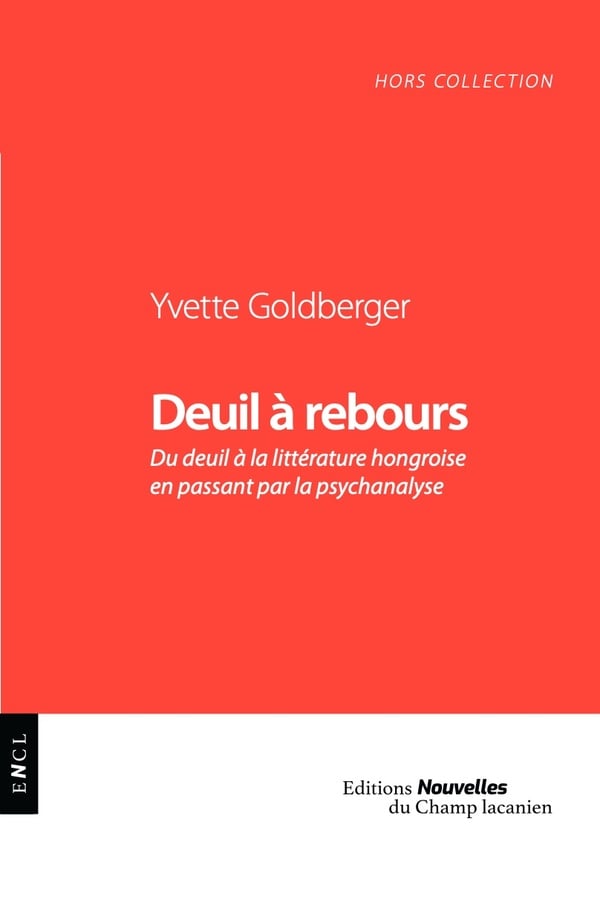On May 7, the prelude bookstore offered a presentation of Yvette Goldberger, about her book entitled Rebound mourning – From mourning to Hungarian literature via psychoanalysis. Associating Hungarian literature, psychoanalysis, mourning and particular humor, Back -up is a unique book. When he came to Budapest, Yvette Goldberger gave us an overview of the genesis of her work.
Yvette Goldberger was born in Toulouse, in 1942, from a Hungarian family who left the country before the Second World War, to flee anti -Semitism. Clinical psychologist by trade, she worked in the oncopediatric service of the Toulouse University Hospital Center. Passionate about psychoanalysis, she is also fascinated by Hungarian writers, organized numerous meetings and conferences in Toulouse concerning them and regularly exchanges about their works within a reading club that she animates.
An unforeseen book
 Yvette Goldberger started presenting her book with an amazing statement: her book turned out to be a surprise. Indeed, her first intention was simply to compile her writings about the Hungarian authors whom she had studied. However, a strong intuition pushes her to add her articles about her professional practice with sick children. Then comes the question of how to link them to each other? These themes, disparate at first glance, will then braid each other and form a very coherent.
Yvette Goldberger started presenting her book with an amazing statement: her book turned out to be a surprise. Indeed, her first intention was simply to compile her writings about the Hungarian authors whom she had studied. However, a strong intuition pushes her to add her articles about her professional practice with sick children. Then comes the question of how to link them to each other? These themes, disparate at first glance, will then braid each other and form a very coherent.
Mourning
Once the links between the main subjects are committed, the mourning theme appears clearly for Yvette Goldberger. First, he found himself in his family roots: of Jewish origin, his family suffered persecution as well as painful losses during the dark period of the Second World War. Then, mourning is also present in his professional daily life, through the follow -up of children with leukemia. In these medical professions, mourning lies in the shadows while remaining cruelly present. A distance from the patients is then essential and absolutely necessary, but unfortunately not always obvious to maintain.
Yvette Goldberger told us that she had not noticed how her personal story was crossed by mourning. It was by “looking back” that the theme turned out to be essential. Thus, the title of his work takes on its full meaning: Mourning to counts.
Another remarkable aspect of this work, underlined Guillaume Métayer, author of the afterword and present during the presentation, is the omnipresent aspect of “live introspection”. Indeed, even if Yvette Goldberger had no intention of writing on herself, the reflections and personal discoveries abound. Thus, Guillaume Métayer suggests that this work could have constituted for Yvette Goldberger, a series of psychoanalytic cure.
Hungarian literature
As mentioned above, Yvette Goldberger is also passionate about Hungarian literature authors. In his work, more than 70 books are mentioned to illustrate his words and build the different themes. Indeed, she explains that some of these works are particularly revealing when interpreted from a psychoanalytic point of view. A striking example is the story Voyage around my skull From Karinthy frigyes. In this book, Karinthy relates a horrible post-operative nightmare with destabilizing irony. This narration is however symptomatic of the author’s psyche and unconscious mechanisms. Yvette Goldberger even invents a word to refer to this type of writing: cry, condensed between crying and laughing. This term relates to a strong and deep emotion, going beyond simply crying. It translates a certain ambivalence of emotion, a cohabitation between pain and a paradoxical “happiness”.

The humor
Yvette Goldberger concludes her presentation with a theme that differs from classical humor as well as black humor and which she considers a narrative process aimed at disconcerting the reader. The humor is indeed a distinct process since it does not happen in an impromptu way in the narration but is on the contrary inscribes in it and is anchored over the course of development. The humor also causes questioning by its effect of destabilization when humor produces a certain degree of satisfaction. Yvette Goldberger adds that this derision effect is used a good number of times by Hungarian authors, who excels in this area. In particular, she quotes Ádám Bodor and her work Verhovina’s birds. She explains that when this author illustrates appalling scenes he uses the comic effect more than the feeling of horror in order to give a “normal” character to these however abominable situations. His poetic and sweet writing contrasts with the horrors he tells. However, Yvette Goldberger specifies that humor is a particular humor, which can make it uncomfortable, and cause a sometimes “shameful” laugh. This humor would, according to some criticism, specific to Hungarian writers and Eastern Europe who have known Stalinism and dictatorship.
Yvette Goldberger offered us an amazing and unique book. Back -up In an unprecedented illumination of the unknown paths of the human psyche and its ambiguous functioning. A work necessary according to the words of Guillaume Métayer, combining with confusing themes.
Manon guignard & manon wermeille
Photos: László Kinga

